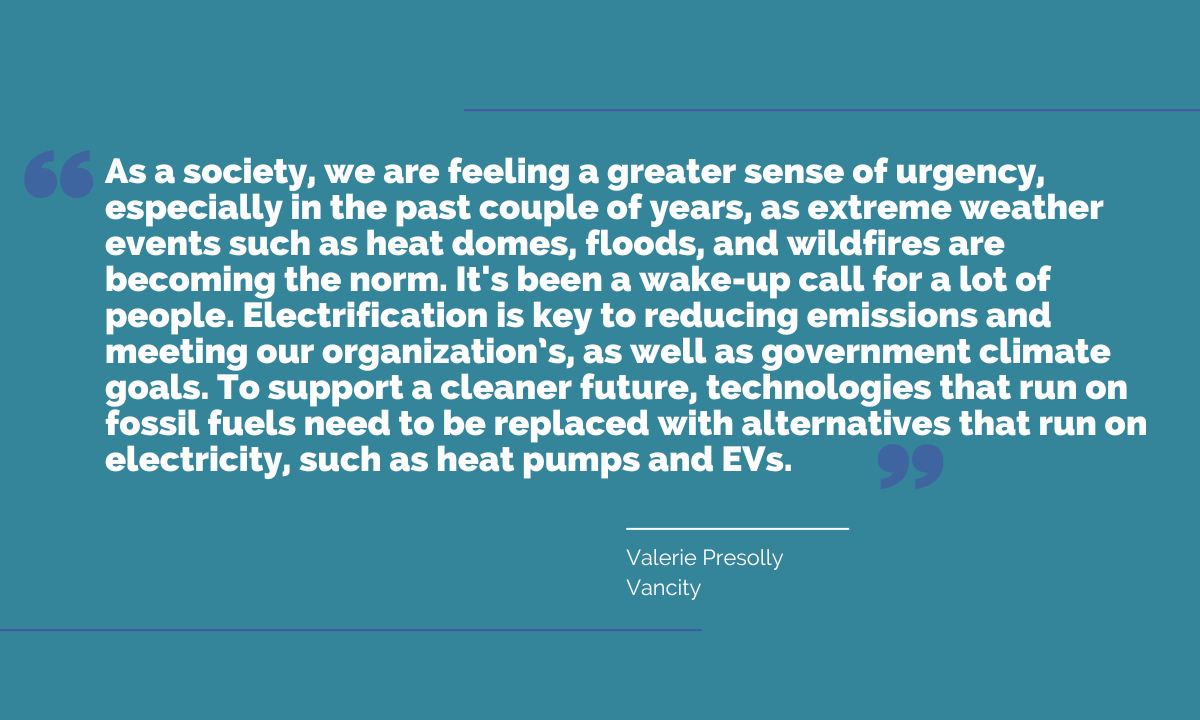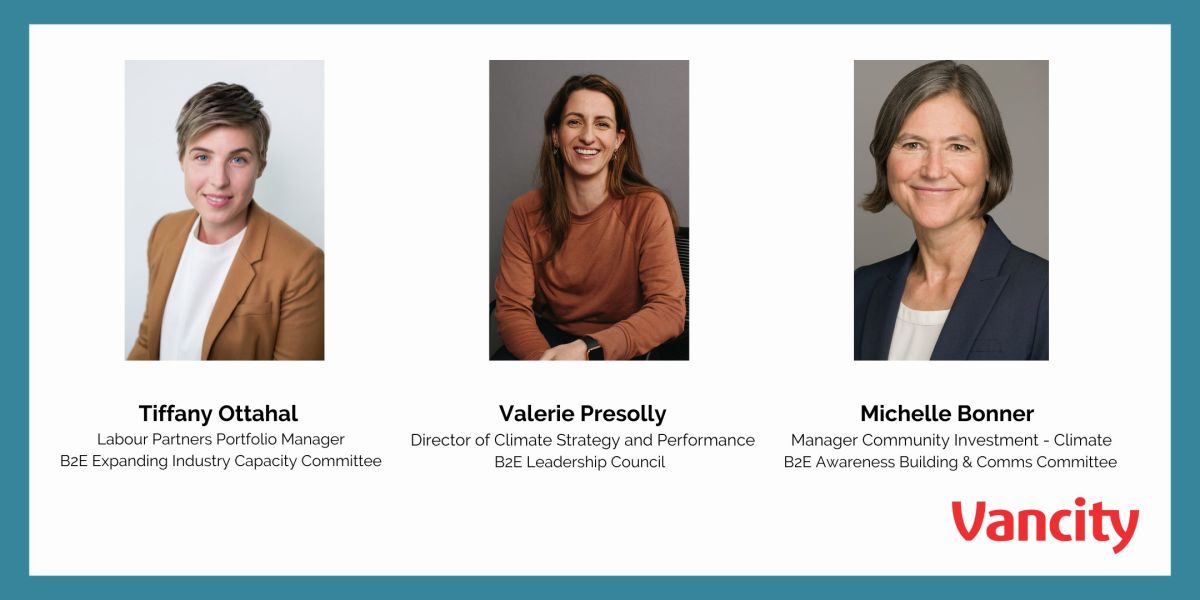
Meet some of the faces driving community change at Vancity, a member-owned, full-service financial cooperative with 54 branches across BC, and a B2E member since October 2021. As a values-based organization, Vancity is working to leverage their assets to help achieve a vision of a transformed economy that protects the earth and guarantees equity for all.
Vancity has a target to be net-zero across its mortgages and loans by 2040. As a step to this target, it is committed to a 27% reduction in absolute financed emissions for commercial real estate service buildings by 2025 (from a 2019 base year), and net zero by 2040. Vancity also has aggressive reduction targets for financed emissions from residential buildings, as well as engagement targets for businesses in high-emitting sectors.
We sat down with Tiffany Ottahal, Valerie Presolly, and Michelle Bonner to talk about how they’re supporting a climate transition that puts people at the centre and leaves nobody behind.
Why did you become a B2E member?
Michelle: We know that building electrification is going to be a key way to make progress toward our net zero target. We were happy to see the creation of the coalition as a commitment and a pathway to implement the Building Electrification Road Map (BERM). The organisation saw it as another opportunity to talk with stakeholders, other colleagues and peer organisations that were committed to the same goal and finding opportunities where we can collaborate, work together, and share information.
What impact has the B2E community had on you/your organization?
Michelle: I have found it very valuable as a place to learn from peers in different organizations and hear about what they're doing. It’s been a helpful forum to discuss the gaps we see in terms of communication and the uptake of electrification. Good ideas are generated and it’s a place to share what Vancity is doing. There's been some nice collaboration, so I’ve found real value there.
Tiffany: It brings together such a diverse group of people that, normally, we don't hear from. Historically, I have focused on the workforce side of green construction and climate transition preparedness, not from the employer side. Because the group brings together everyone, there is an understanding of the pressures, the supply chain issues, the delays and the frustrations that we're seeing in the retrofit economy. We bring that back to the credit union and that's informing our strategy from the retrofit side of things.
Valerie: There are many peers in a similar boat as us. B2E provides the opportunity to connect with peers and talk about some of these sticky items, figure things out together or and learn from each other.
Tell us about an exciting building electrification project that you’re working on.
Tiffany: There are a number of Union Training Centres that are also members of the credit union. We're really excited to partner with them to help them do some internal work to develop upskilling curriculum for their members to support the electrification of buildings and electric vehicle charging station installation and maintenance. These partnerships provide new spaces for a more diverse workforce, including Indigenous learners and newcomers. We’re helping to create a curriculum that can continue to be used in the training centres and create capacity.
I am also working with the BC Centre for Women in the trades which has a mandate to help support more women, newcomers and equity-seeking groups get into the building trades and green jobs. As we're doing that work, we're seeing a very applied opportunity for more workers to meet the needs that we see coming as the green transition picks up steam.
Michelle: A new program, the Non-Profit Housing Retrofit Program, was launched in the spring to help our non-profit housing provider members, including co-ops, move toward near net zero in their buildings, which involves electrification. We've provided funding to a community partner, Affine Climate Solutions, to work with Brightside Homes to walk through the process of planning for a very deep retrofit for one of their buildings. We'll learn a lot from that in terms of how Vancity can play a role as a grantor and as a financier, and what sort of financing we can develop to help buildings electrify.
The other project that I'm excited about is supporting the development of a building electrification roadmap specifically for low-income and social housing sector. I'm happy that Vancity is at the table and enabling some of our partners to be at the table as project partners and funders.
What do you see as a key driver in advancing electrification in your industry?

Do you have any advice for other organizations that want to follow your path?
Tiffany: The financial sector is such a key partner in the conversation around retrofits, green construction, and the just transition. Our sector cannot continue to operate the way it has been, it needs to shift as part of the big global shift of how the economy will work, and we’re eager for more folks in the room to talk about how to do that.
On a personal level, find your “why”. Each person connects to the climate crisis in different ways. Consider the “why” of other people within your organization; it might be kids, grandkids, future generations, employee experience, leadership, cost reduction. Knowing your “why” and finding your organization's is a good starting point.
Valerie: This is new and can be daunting, and there are a lot of organizations who want to make a difference. My advice would be to just get started. It's going to be imperfect, and it's going to be messy – this is all the journey, there’s always more to do, there's always more to learn. The important piece is just to get started.
In our industry, we have joined the Net Zero Banking Alliance and other groups/alliances to get support to achieve our net zero goals.
Michelle: Addressing the climate crisis will require fundamental changes at both the personal and systemic levels. It will mean doing things differently. There are lots of organizations in the same boat and plenty of advice to be shared. Vancity has been working on climate action and equity for a long time, but there is more to learn. Groups like the Net Zero Banking Alliance and the Global Alliance for Banking on Values provide great forums for knowledge sharing. There's not one recipe, there's no clear path. We all have to get in there and start.
With thanks to:
 b2e@zeic.ca
b2e@zeic.ca



